When considering the wide and ever expanding world of saltwater angling, suddenly an eight pound fish doesn’t seem worth dying for.
Yet even as the relentless swells of an angry Atlantic fought the boat back towards the harbor, Jack and I remained silent, our eyes both locked on the horizon. The flock of terns we’d been watching maintained their position in the gray September sky, hovering over something we couldn’t yet see but had no doubt existed. There was an unspoken agreement, unprotested by either of us and confirmed by Jack’s lay into the throttle: We were going for it.
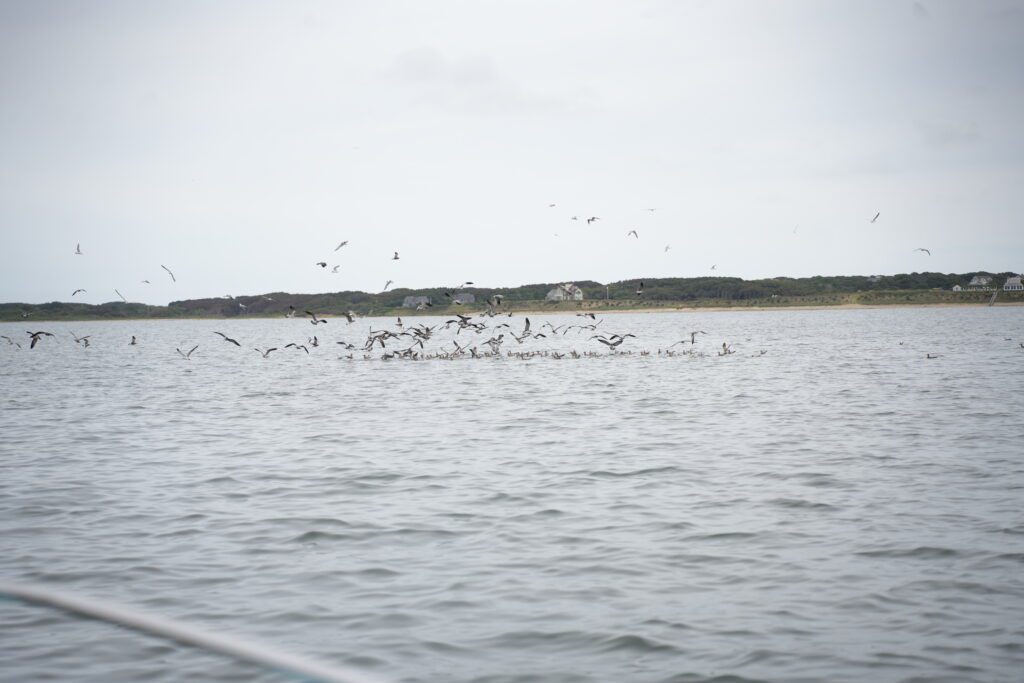

I’d always been a little skeptical about visiting Nantucket. From an upbringing on the northeastern mainland, the only reputation the island had was that of a millionaires’ playground occupied by legions of pastel clad, out of touch, second home owners with a backwards society fit for an omitted section of Gulliver’s Travels. Now that I was a few days into my trip, I can confidently say that this take was… somewhat spot on. But not entirely, since while fishing with Jack I was introduced to a die-hard faction of local talented anglers that allowed me to look past my imposter syndrome and focus on a fishing culture richer than anyone could afford.
Dedicated conservation efforts and Nantucket’s remoteness have helped it maintain its status as one of New England’s best inshore fisheries. Jack had been demonstrating this to me for years during his visits; In summers I was always ready for a deluge of texts featuring pictures of huge striped bass and bluefish from the island. But it was always Jack’s adventures in the Fall that piqued my interest the most. The arrival of false albacore and bonito during this season is a massive draw for resident and traveling anglers. I’d had a desire to catch these fish and a standing invite from Jack for a couple of years, and now that I was back in New England it was time to cash in on both.
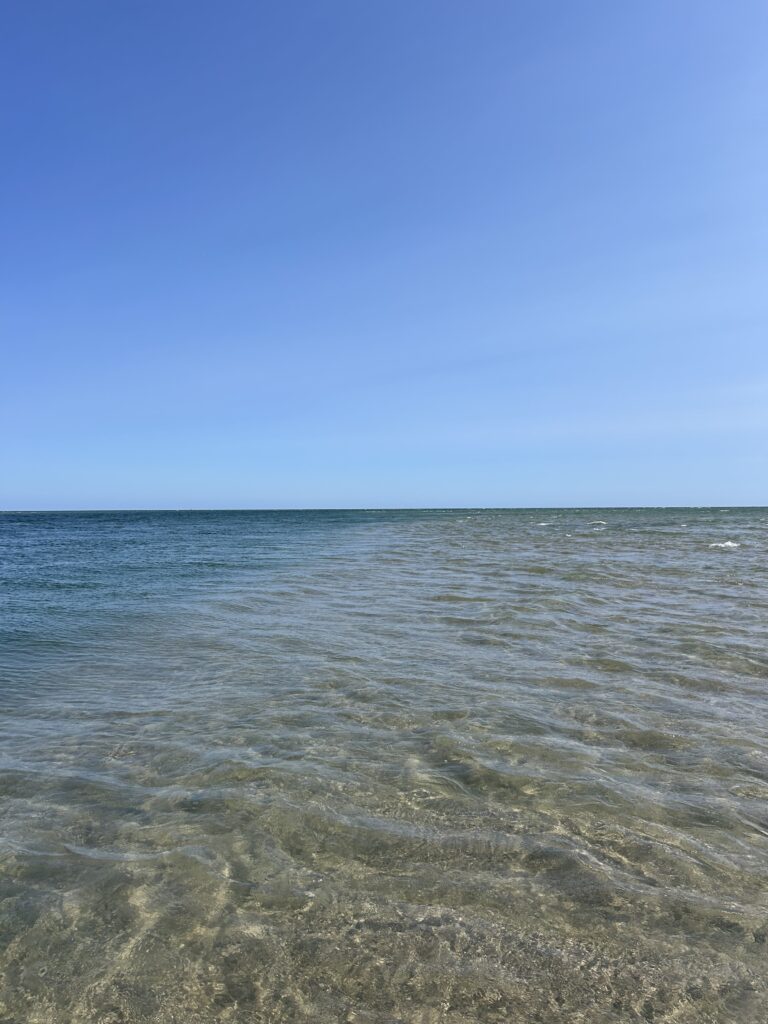

A large chunk of my time on the trip was spent fishing from the beach. I blasted casts through various tide changes for hours at all times of the day, wading expansive sandbars and flats with the hopes of coming across a group of fish on the surface. For the most part it was a game of blind casting as far as you could and burning in an epoxy baitfish pattern with a two handed strip retrieve. There were, however, a few fleeting encounters with topwater blitzes. These experiences were through in a blink of an eye— A few birds would congregate in the air and hover over a school of bait pushed to the surface, a few violent slashes would come from below and boil the water for a split second, then it was over. If you were lucky enough to have one go off close to you, you’d likely have a single cast before the fish went down and sped on to their next victims. Then it was back to monotonously casting, hoping for a blind take.
Although the anticipation of a beachside eat and the occasional heart-stopping appearance of massive seals next to you in chest deep water was enough to keep me on my toes, it was clear that we’d have to take to the sea if we wanted more shots on fly. The breakers separated the civilized island from the wilderness that survived on the ocean, and it didn’t take long on our afternoon guide trip for our target species to make an appearance.


Carl Danielson, our guide with Captain Tom’s Charters, patrolled the boat through rolling waters off of one of Nantucket’s points as Jack and I casted and retrieved repeatedly from the deck. For me, the collision of the currents here was almost impossible to read. Unlike the seams off the beach or in a river, every flowing feature seemed to constantly be on the move. We’d follow swells with our boat, or slosh around down a moving slack patch. I learned that false albacore and bonito used these areas to ambush bait that became caught in the fluid chaos. I didn’t blame them; If the smaller fish were as lost and seasick as I was, they’d be done for.
Almost the first half of our trip was quiet with no bites and no signs of life. Then Jack swore he spotted a fish, but by the time I could focus on where he was looking it was gone. I missed the next sighting shortly after as well. But finally, on a nauseating swell that looked like all of the others, I watched a silver football glide just under the surface. Its back briefly broke the water, and the sun flashed off its aquamarine siding. On the next cast, I was tight.
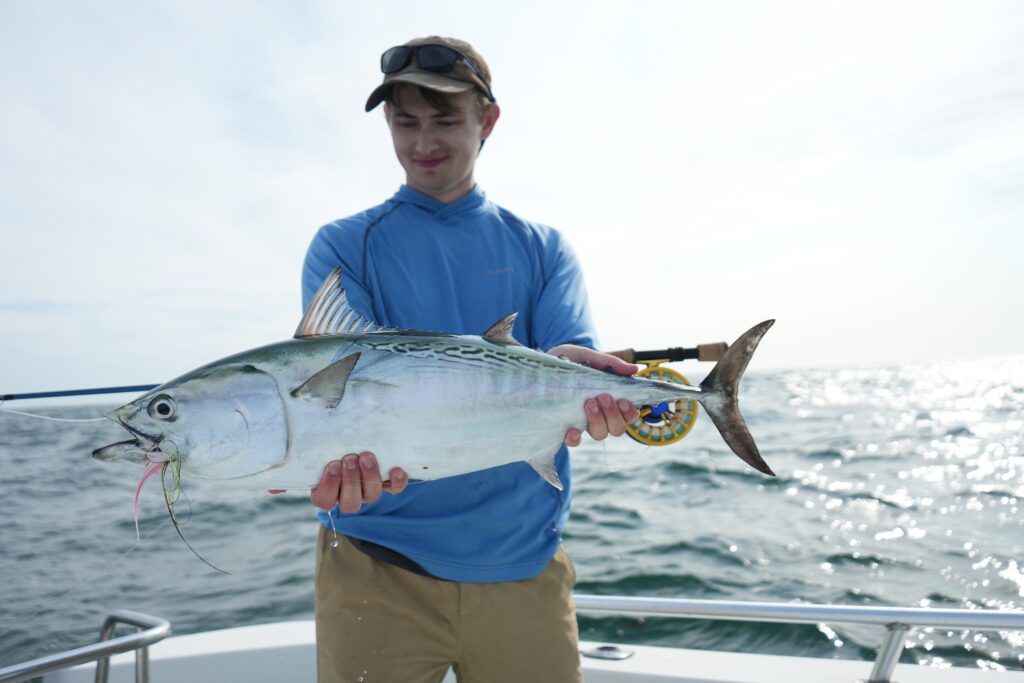

Out of a dead ocean, we were suddenly surrounded. These weren’t the topwater blitzes I had seen and heard about for all of these years. Instead it was a silent ambush, with the fish’s presence only given away on the rise of each wave. They were moving within the swells, and on some particularly high crests a wall of fish would be level with me in the boat. Even with a hooked false albacore actively depleting my reel, I couldn’t help but look around in awe.
For the rest of the afternoon, we followed the school through the waves, getting an eat or hooking up on almost every cast. I even caught my first bonito mixed in among the albacore.
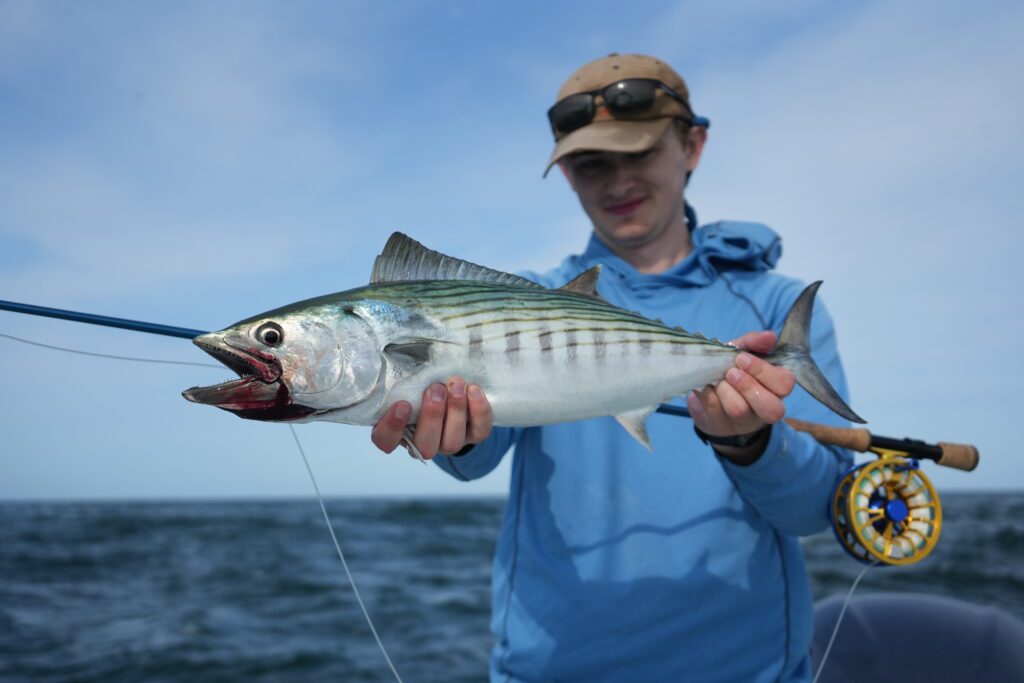

Jack and I continued to double up and bring fish to the boat until Carl had to get us back. We blasted to the harbor with the wind this time, Jack and Carl chatting comfortably behind the console as I worked on processing what had happened. From this mostly freshwater angler’s perspective, I felt like I had just been in an episode of Blue Planet. Finally getting my first encounters with hardtails made my trip right there, and I wasn’t sure how’d we be able to keep the momentum for the next two days.
But that’s when Jack got a boat. The seventeen-foot 60s era Boston Whaler was a last minute rental find. It was baby blue with wood inlays and benches and a 70 horsepower outboard. The deck was a bit cramped, and the mounted light bar off of the back looked like a false cast magnet, but we knew we’d need to get on the water if we wanted more shots at fish before I left.
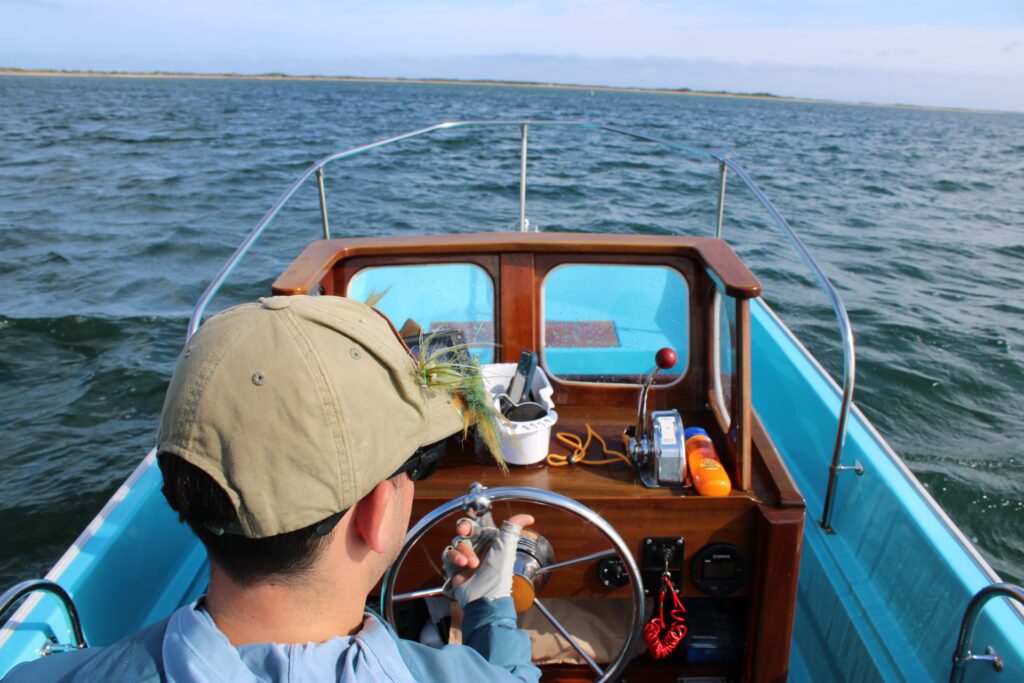

We greenlit the DIY outing knowing we’d at least be good in Nantucket Harbor. This boat wasn’t meant to withstand the whirlpool we’d reached on our guided trip, so we would have to start from scratch with locating fish. I was (and am) wildly unadjusted to boat life and reading the ocean, which for better or for worse mostly assigned me as the designated angler. Jack’s skill at the wheel and expert eye for locating blitzes before they happened would get us into position for me not to screw up casts.
Searching for fish in the harbor was a different game than moving with massive schools in the open ocean. Any slight congregation of birds or nervous water likely meant we were already too late to the party, and if we couldn’t get to the brief surface activity or I couldn’t get a cast off in time, we would have to start over. We slowly worked around the open water, keeping our eyes peeled for signs of life. Besides a few quick blitzes seen from a distance and some tiny snapper bluefish, we were coming up empty.
After a few hours, we took a wider lap that brought us into view of the harbor’s jetty. Right away we both noticed a massive school of birds on the jetty’s far side, where the unsheltered sea was kicking up strongly in the high winds and moving tide. It had been a long day with not much to show, and our desire to discover what lay beyond our self-imposed boundary drew us closer and closer to the harbor’s exit. We rounded the corner, and below the birds we saw a blitz that even my untrained eye couldn’t miss. Beyond that, another froth of hardtails fed on the side of a huge swell. We realized that the birds we had seen from the bay weren’t one big mass, but several dozen smaller flocks, each hovering over its own violent feeding frenzy.
We were soaked from fighting through the incoming waves just to get to this vantage point, but Jack didn’t turn around and I didn’t protest. I could tell we were both apprehensive and trying to decide between leaving the blitzes or seeing if we could reach them. Then just a few hundred feet from us a fish blew up, and then another. “Yup.” I said. “Yup.” Jack said. And the blue boat roared forward.
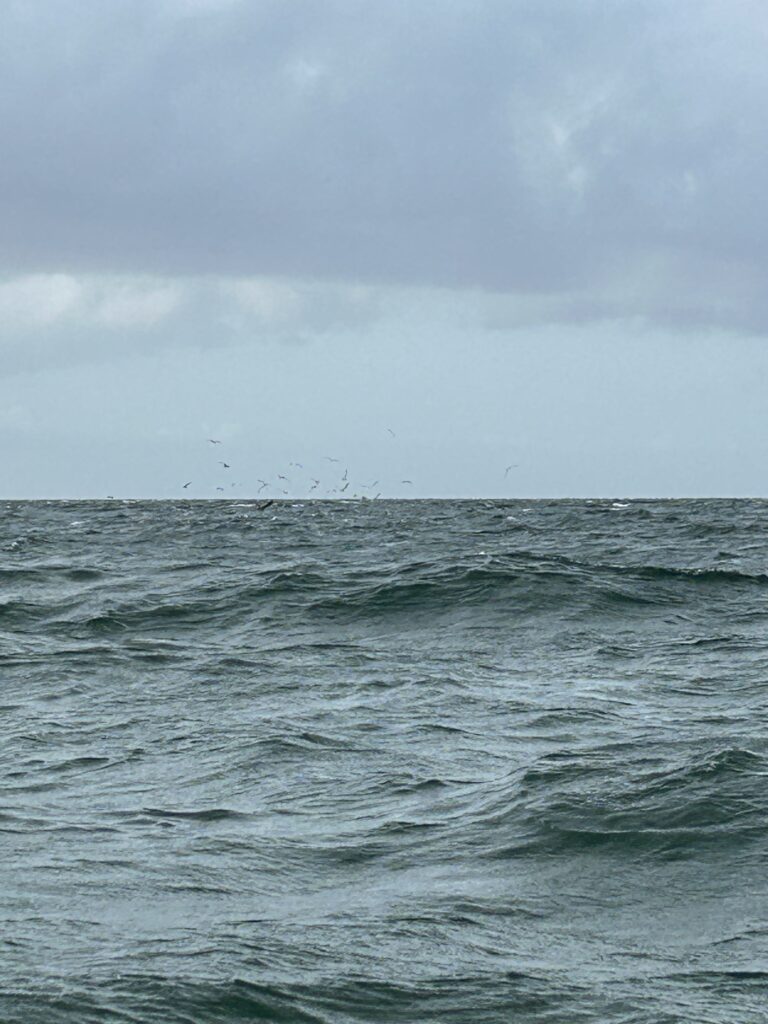

It still took a few shots. Though plentiful, the schools still moved maddeningly fast. The added factors of wind and waves slowed us down and made casting difficult. Jack was now on full boat duty and had to adjust constantly to avoid having a swell blow up over our bow. He couldn’t wait for me to finish a cast or gather my line, and my focus on those two aspects of my fishing often rendered me unprepared for a quick move. All I could do was hit the ground and get my fly line out of the way of the churning motor.
Eventually, by Jack’s skillful boating and my occasional decent cast, we started crushing fish. We developed a system where I’d fish from the back of the boat (standing elevated on the bow with the boat flying over big waves was out of the question) and Jack would maneuver us upwind so I could drop a long cast over a blitz. A fish would be torching my reel, Jack would be accelerating over a big swell in the opposite direction, I’d be thrown to the ground. It was a beautiful, somewhat unsafe mayhem, but it was working.
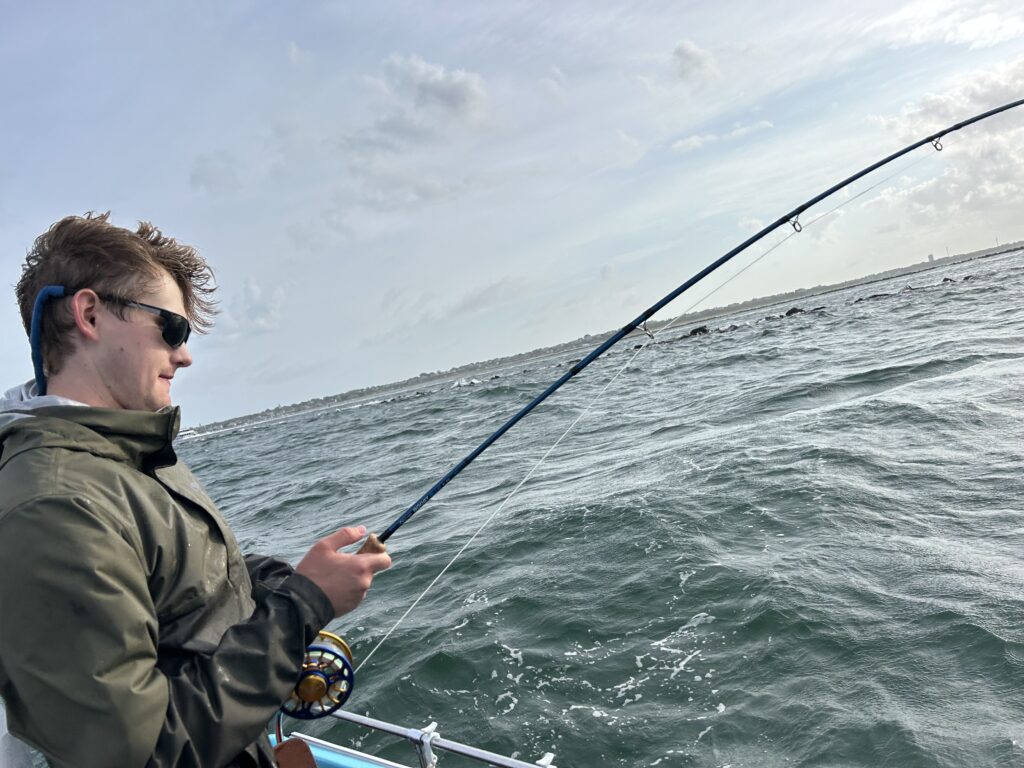

Before we knew it, the sun was going down. We had been getting knocked around on the outside of the harbor for over four hours, a good amount of time on its own, but it had felt like its own day. Jack and my interactions had turned into a series of yelling and pointing, with a few “hang on!”s from Jack during rapid moves. Jack had been selflessly keeping me alive while I fished, and with us both having a better feel for how the water was behaving it was decided he should come off the controls for a few minutes before we headed in. He proceeded to make his time count with the biggest albie of the day, brought in with a fight that may or may not have involved me taking the wheel and pulling Jack’s upper body out of the ocean.


On my last day of the trip we caught one bonito in ten hours of fishing from the blue boat. We employed the same strategies we had used the day before and explored new locations, but the blitzes never showed and we couldn’t find anything blind fishing. It never feels good to not figure them out, but after our success the day before we were at least happy for the down time. It was a much calmer day as well, allowing Jack and I to take a break from white knuckling various holds on the boat at all times. We brought lunch, broke out the cameras, and recounted the events from the previous few days.
Part of me wonders what those last two days would’ve been like if we hadn’t had the idea to at least go look at the outside. We could’ve puttered around the harbor for hours without an inkling of what was going on just a short boat ride away. These little opportunity costs happen more often than we think in fishing, but we don’t always see examples of them in such black and white.
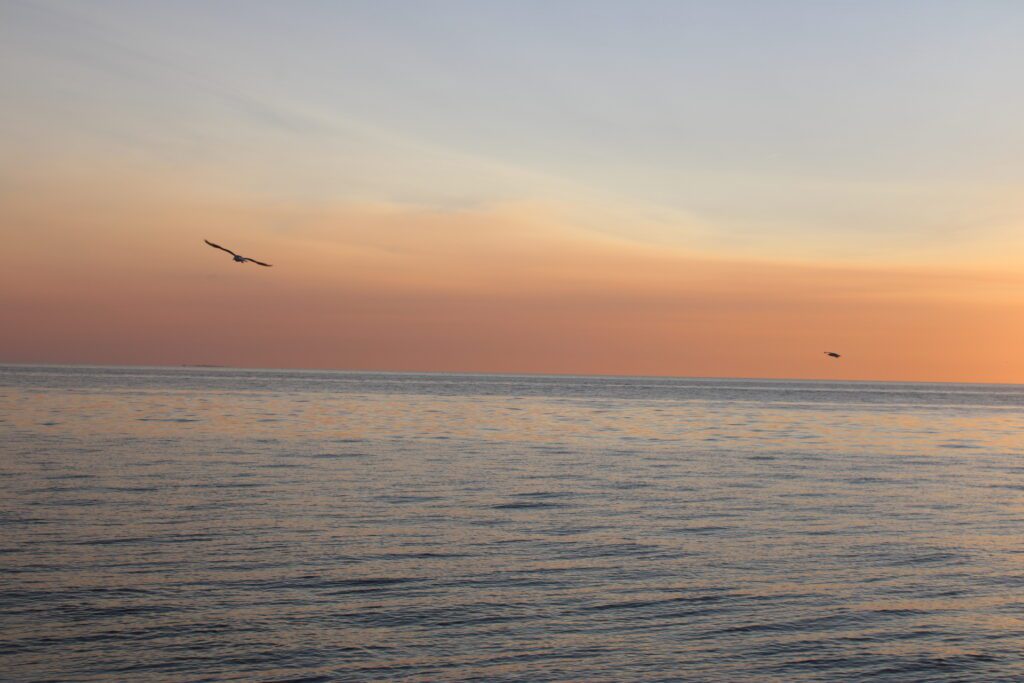

Though in a place whipped by an ever moving riptide where fish are there one day and gone the next, there’s no time to think about what was or could’ve been. Read some articles covering Nantucket’s shorefront homes being devoured by rising seas and harsher storms, and you’ll see that even a picturesque high-class vacation town isn’t immune to change.
Nature doesn’t wait for you to book a vacation, or for you to decide to go outside. That doesn’t mean you don’t have an option to enjoy it through its many forms. Experience the wild’s inspiring beauty and its terrifying power, however it is presented to you.
And then, like our little blue boat, just move along.


